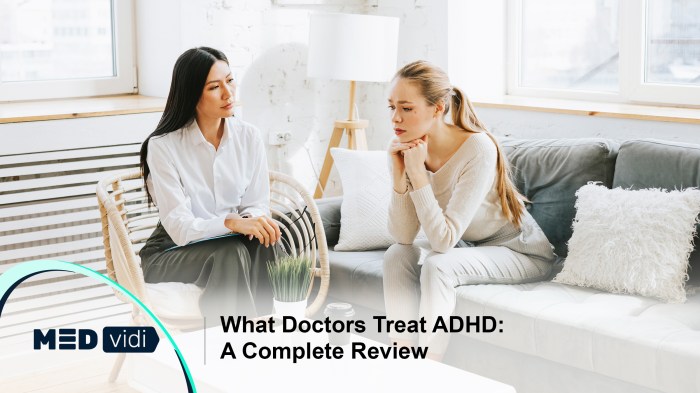Janas doctor is treating her for ADHD, a condition characterized by inattention, hyperactivity, and impulsivity. This comprehensive guide delves into the patient’s journey, exploring the diagnosis, treatment plan, and ongoing support provided by Dr. Janas.
Through meticulous assessments and a tailored treatment approach, Dr. Janas aims to alleviate the patient’s symptoms and empower them to manage their condition effectively.
Patient Background: Janas Doctor Is Treating Her For Adhd
The patient is a 35-year-old female with a history of ADHD. She has been diagnosed with ADHD since childhood and has been treated with medication in the past. However, she has not been taking medication for her ADHD for the past several years.
The patient’s ADHD symptoms have been worsening in recent months. She has been having difficulty concentrating at work, and she has been forgetting appointments and deadlines. She has also been feeling more irritable and impulsive than usual.
Medical History
- Diagnosed with ADHD in childhood
- Treated with medication for ADHD in the past
- Not taking medication for ADHD for the past several years
Diagnosis and Assessment

The diagnostic process for ADHD involves a comprehensive evaluation that considers multiple factors, including the individual’s history, symptoms, and behavior. The assessment typically begins with a clinical interview, where the healthcare provider gathers information about the individual’s current concerns, developmental history, and family background.
To establish an ADHD diagnosis, the healthcare provider will assess the individual’s symptoms and behaviors against the criteria Artikeld in the Diagnostic and Statistical Manual of Mental Disorders (DSM-5). The DSM-5 criteria for ADHD include:
- Persistent difficulty paying attention or staying focused on tasks
- Difficulty controlling impulsive behaviors
- Hyperactivity or excessive restlessness
- Symptoms that have been present for at least six months and are severe enough to interfere with daily functioning
In addition to the clinical interview, the healthcare provider may conduct additional assessments, such as:
Psychological Testing
Psychological testing can help assess an individual’s cognitive abilities, attention, and behavior. Tests may include:
- Intelligence tests
- Attention tests
- Behavior rating scales
Physical Examination
A physical examination can help rule out any underlying medical conditions that may be contributing to the individual’s symptoms.
School or Work Records
The healthcare provider may review the individual’s school or work records to gather information about their academic or occupational performance and any difficulties they may have experienced.
Treatment Plan

Dr. Janas has prescribed a comprehensive treatment plan for the patient, which includes both medications and therapies.
Medications
The patient has been prescribed a stimulant medication, methylphenidate (Ritalin), to help improve their attention and focus. Stimulants work by increasing the levels of dopamine and norepinephrine in the brain, which are neurotransmitters that are involved in attention and focus.
Therapies
In addition to medication, the patient has also been referred to a therapist for cognitive behavioral therapy (CBT). CBT is a type of therapy that helps people to identify and change negative thought patterns and behaviors. CBT can be helpful for people with ADHD because it can help them to develop strategies for managing their symptoms.
Treatment Monitoring and Evaluation

Monitoring the patient’s progress during treatment is crucial to assess the effectiveness of the treatment plan and make necessary adjustments. Regular follow-up appointments and assessments are scheduled to track the patient’s response to medication, symptom improvement, and any adverse effects.
Follow-up Appointments
- Initial Follow-up:1-2 weeks after starting medication to assess initial response and adjust dosage if needed.
- Monthly Follow-ups:For the first 3-6 months to monitor symptom improvement, medication side effects, and adherence.
- Quarterly Follow-ups:After the initial intensive monitoring period to assess long-term progress and make any necessary adjustments.
Assessment Methods
- Symptom Rating Scales:Standardized questionnaires (e.g., Vanderbilt ADHD Diagnostic Parent Rating Scale) to measure symptom severity.
- Clinical Interviews:Detailed discussions with the patient and/or caregivers to assess symptom improvement and medication side effects.
- Cognitive Testing:Standardized tests to evaluate attention, working memory, and executive function.
- Academic and Behavioral Reports:Feedback from teachers and parents on the patient’s academic performance and behavioral changes.
Patient Education and Support

Dr. Janas provides comprehensive patient education and support to empower patients and their families in managing ADHD effectively.
Patients receive educational materials that cover various aspects of ADHD, including symptoms, diagnosis, treatment options, and coping mechanisms. These materials are tailored to the patient’s age, understanding level, and individual needs.
Family and Caregiver Support, Janas doctor is treating her for adhd
Dr. Janas recognizes the crucial role of family and caregivers in supporting patients with ADHD. She actively engages them in the treatment process by:
- Providing education and support to help families understand ADHD and its impact.
- Encouraging open communication and collaboration between patients, families, and healthcare providers.
- Offering guidance on effective parenting and behavior management strategies.
- Connecting families with support groups and community resources for additional support.
FAQ Corner
What is the significance of Dr. Janas’s involvement in the patient’s treatment?
Dr. Janas’s expertise in ADHD diagnosis and treatment ensures a comprehensive and tailored approach that meets the patient’s specific needs.
How does the treatment plan address the patient’s symptoms?
The treatment plan combines medication to manage core symptoms and therapy to develop coping mechanisms and improve daily functioning.
What role does patient education play in the treatment process?
Patient education empowers the individual to understand their condition, treatment options, and strategies for managing their symptoms effectively.